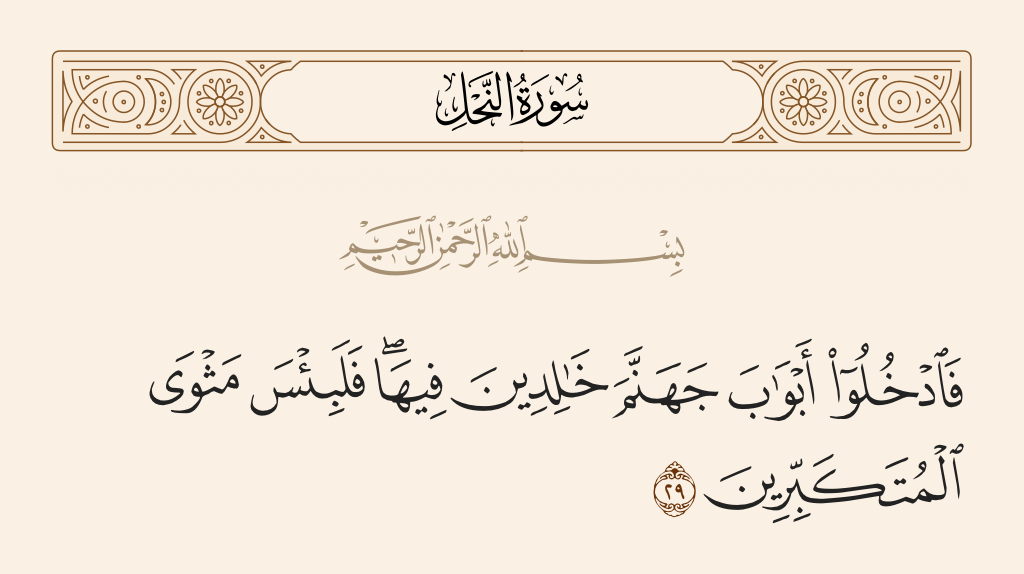Surat An-Nahl Verse No. 29: Reading and listening
Translation of the verse 29 from Surah An-Nahl : Number of verses 128 - - page 270 - Part 14.

﴾فَٱدۡخُلُوٓاْ أَبۡوَٰبَ جَهَنَّمَ خَٰلِدِينَ فِيهَاۖ فَلَبِئۡسَ مَثۡوَى ٱلۡمُتَكَبِّرِينَ ﴿
[ النحل: 29]
"So enter the gates of Hell, to abide therein, and indeed, what an evil abode will be for the arrogant."
English - Sahih International
So enter the gates of Hell to abide eternally therein, and how wretched is the residence of the arrogant.
Tafheem-ul-Quran by Syed Abu-al-A'la Maududi
(16:29) Now, go and enter the gates of Hell, where you shall abide for ever. " *26 The fact is that a very miserable abode it is for the haughty ones.
Tafheem-ul-Quran by Syed Abu-al-A'la Maududi
*26) This verse (28) and verse 32, and several other verses in the Qur'an, clearly and definitely assert that immediately after death, souls suffer torment or enjoy peace in the world of Barzakh. The Traditions use the word "qabar" (grave) metaphorically for this existence of the souls. This is the world in which souls enter immediately after death and will remain therein up to the Day of Resurrection. Yet the disbelievers of the Traditions declare that after death souls will remain in a dormant state up to the time of Resurrection, and will neither feel any pain nor joy, nor will be conscious of anything at all. Obviously, this is a wrong opinion, for according to v. 28, just after death when the disbelievers will be conscious of the fact that they had been leading an evil life, they will try to make the angels believe that they had not done any evil deed. The angels will rebuke them at this "boldness" and will tell them that they shall have to go into Hell. On the other hand, according to verse 32, just after their death, the pious believers are welcomed by the angels and given the good news that they will enter into Paradise. Besides these verses, there is the mention of a dialogue between the angels and those Muslims, who did not migrate to Al-Madinah, after their souls were seized by the angels in IV: 97. Above all, according to XL: 45-46, the people of Pharaoh have been encircled by a torment and are exposed before the Fire of Hell every morning and every evening. This will go on up to the Day of Resurrection when they shall be sentenced to eternal torment.
In fact, both the Qur'an and the Traditions present the same kind of picture of the condition of the soul after death up to Resurrection. Death causes merely the separation of the soul from the body but does not annihilate it. The soul lives with the same personality that was formed by the different experiences and the mental exercises and moral activities it had in its worldly life in co-operation with the body. This nature of the consciousness, feelings, observations and experiences of the soul, during the waiting period, is similar to that, in a dream. Just as a criminal sentenced to death suffers from mental torture on the eve of his crucifixion, in the same way the angels take to task the guilty as in a dream, torture it and take it to the horrible Hell in order to make it fore-taste the impending torture. In contrast to this, the pure soul is welcomed by the angels and is given the good news of entry into paradise and is made to enjoy its pleasant breeze and smell, and to feel happy like the faithful servant who is invited to the headquarters to receive his reward. But this "life" in the world of Barzakh will suddenly come to an end on the second blowing of the Trumpet of Resurrection. When the guilty souls will again enter into their former bodies and muster in the Plain, they will cry in horror, "Oh ! woe to us! who has roused us from our sleeping places ?" But the true Believers will say with perfect peace of mind, "This is exactly what the Beneficent had predicted, and the Messengers had told the truth." (XXXVI: 52).
This has been further elucidated in Chapter XXX.
As the guilty ones will be under the delusion that they had been lying in their death-bed for an hour or so and had been roused from given Knowledge and Faith, will say. "According to the Record of Allah, you have remained after death till this Day of Resurrection and this is the same Day of Resurrection, but you did not know this." (XXX: 55-56).